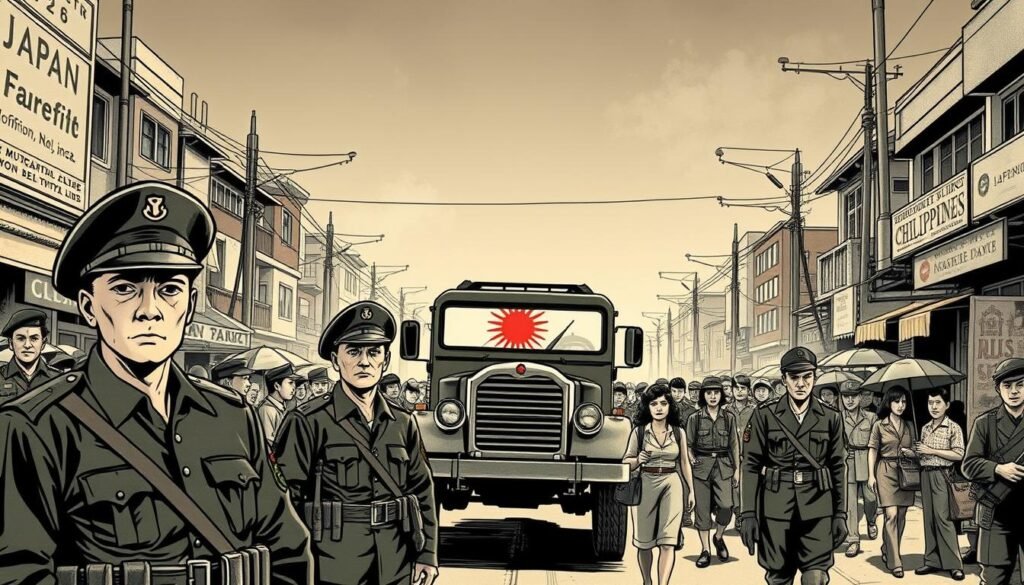The Japanese occupation of the Philippines from 1942 to 1945 left a lasting mark on Filipino society. This period of military control brought significant changes to daily life, culture, and the economy. The word “occupation” often evokes images of conflict, but its effects went far beyond the battlefield.
During this time, many Filipinos saw their jobs and careers disrupted. Traditional roles shifted as people adapted to new challenges. For example, the black market economy grew, and professions like farming faced severe shortages. These changes reshaped the way a person worked and lived.
Culturally, the occupation introduced new influences while challenging existing traditions. The long-term impact can still be seen today in the Philippines’ industries and societal structures. Understanding this history helps us appreciate the resilience of the Filipino people.
Key Takeaways
- The Japanese occupation deeply affected Filipino society, culture, and economy.
- Daily work and traditional roles were disrupted during this period.
- The black market economy flourished due to shortages and inflation.
- Cultural shifts occurred, blending new influences with existing traditions.
- The occupation’s legacy continues to shape modern Filipino industries.
Historical Context and Societal Impact
The years 1942 to 1945 marked a pivotal era in Philippine history under Japanese rule. This period saw the country undergo significant changes in governance, economy, and culture. The Japanese military implemented strict control over key regions, disrupting daily activity and reshaping societal roles.

Japanese Military and Administrative Control
The Japanese administration introduced new policies to consolidate power. Forced labor systems were established, affecting over 300,000 Filipinos. This drastically altered the meaning of a job, as many were compelled to work in harsh conditions.
Infrastructure suffered heavily, with 70% of urban areas damaged or destroyed. Food shortages became widespread, impacting nearly 60% of the population. These challenges forced people to adapt, often relying on the black market for survival.
Cultural and Economic Transformations in the Philippines
The occupation also brought cultural shifts. Traditional practices were challenged, while new influences began to blend with existing traditions. The literacy rate dropped from 70% to 40%, reflecting the disruption of educational systems.
Economically, agricultural production declined by 30%, further straining the country‘s resources. Despite these hardships, the resilience of the Filipino person shone through, laying the foundation for post-war recovery.
For more insights into how historical events shaped the Philippines, explore the infrastructure legacy of William Cameron Forbes.
Occupation: Definitions and Diverse Meanings
The term occupation carries diverse meanings, shaped by historical and societal contexts. It can refer to a job, a profession, or even military control. Understanding this word requires exploring its multifaceted definitions.

Glossary of Occupation: From Job to Control
Here’s a breakdown of key terms related to occupation:
- Job: A specific task or role performed for payment.
- Profession: A specialized field requiring advanced training or education.
- Career: A long-term pursuit of professional goals.
For example, a job could be working as a cashier, while a profession might involve being a doctor. A career encompasses the progression from entry-level roles to leadership positions.
Comparing Work, Profession, and Career
The table below highlights the differences between these terms:
| Term | Definition | Example |
|---|---|---|
| Job | A specific task or role | Retail sales associate |
| Profession | Specialized field | Engineer |
| Career | Long-term professional journey | From intern to CEO |
In a military context, occupation refers to the control of a territory by foreign forces. This contrasts with its use in daily life, where it describes a person’s work or livelihood.
“The word ‘occupation’ has evolved over centuries, reflecting its dual meanings in both work and governance.”
By examining these definitions, we gain a clearer understanding of how the term occupation shapes our language and society.
Legacy of Occupation on Filipino Society
The legacy of the Japanese occupation continues to shape Filipino society in profound ways. Its impact extends beyond historical events, influencing culture, community structures, and even modern work environments. Understanding this legacy helps us appreciate the resilience and adaptability of the Filipino people.

Long-Term Impacts on Culture and Community
The occupation left a lasting mark on Filipino culture. Traditional practices were challenged, while new influences blended with existing traditions. For example, the rebuilding of communities after the war showcased the strength of Filipino unity and resourcefulness.
Cultural activities, such as festivals and art forms, were deeply affected. The occupation’s influence can still be seen in the way Filipinos celebrate their heritage today. This blending of old and new has created a unique cultural identity that continues to evolve.
Contemporary Reflections on Historical Lessons
Modern job structures and work environments in the Philippines reflect the occupation’s influence. Many Filipinos reshaped their careers in response to the challenges of that time. This adaptability remains a defining characteristic of the Filipino workforce.
The dynamics of control established during the occupation still resonate today. Contemporary debates about national identity and historical memory often draw parallels to this period. The country’s resilience during the occupation is a testament to its strength and determination.
For more insights into how historical events shaped the Philippines, explore the colonial legacies that continue to influence Filipino society.
Conclusion
The lasting effects of the Japanese occupation in the Philippines reveal a complex interplay of cultural, economic, and societal changes. This period reshaped traditional roles, influenced modern work structures, and left a deep imprint on the country‘s identity.
Understanding the word “occupation” in its multifaceted meanings—whether as a job, a profession, or military control—helps clarify its historical and contemporary significance. For instance, the rebuilding of communities after the war serves as a powerful example of resilience and adaptability.
Today, the lessons from this era continue to shape Filipino society. The dynamics of activity and building during the occupation offer valuable insights into the nation’s enduring strength. As historical sources highlight, the legacy of this period remains a testament to the Filipino spirit.
FAQ
What was the impact of the Japanese occupation on Filipino society?
The Japanese occupation significantly influenced Filipino society by introducing military and administrative control, altering cultural norms, and reshaping the economy. It left a lasting legacy on the country’s history and identity.
How did the Japanese occupation affect the Philippines economically?
During the occupation, the Philippines experienced economic disruptions, including resource exploitation and the collapse of traditional industries. This period also led to long-term changes in trade and labor systems.
What is the difference between occupation as a job and occupation as control?
Occupation as a job refers to a person’s profession or career, such as teaching or engineering. Occupation as control, however, describes the military or administrative takeover of a region, like the Japanese occupation of the Philippines.
How did the Japanese occupation influence Filipino culture?
The occupation introduced new cultural elements, such as language and customs, while also fostering resistance and resilience among Filipinos. These changes continue to shape the nation’s cultural identity today.
What lessons can be learned from the Japanese occupation in the Philippines?
The occupation highlights the importance of resilience, unity, and the preservation of cultural identity during challenging times. It also serves as a reminder of the long-term effects of foreign control on a society.
Source Links
- What were the effects of Japanese occupation on Filipino society? | TutorChase
- Japanese occupation of the Philippines
- Liberation of the Philippines 1945 | The National WWII Museum | New Orleans
- No title found
- The Impact of Social and Cultural Environment on Health – Genes, Behavior, and the Social Environment
- Definition of OCCUPATION
- What is an Occupation: Types, Categories, and Examples – foundit
- Occupational meaning, well-being and coping: A study of culturally and linguistically diverse hotel workers during COVID-19
- History of the Philippines (1898–1946)
- Philippines – Culture, Diversity, Traditions | Britannica
- 9 Conclusions and Recommendations | Work, Jobs, and Occupations: A Critical Review of the Dictionary of Occupational Titles
- Conclusion – Occupied
- Conclusion – The International Law of Belligerent Occupation

